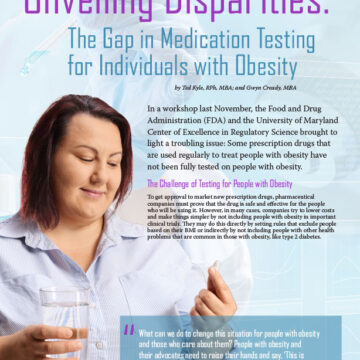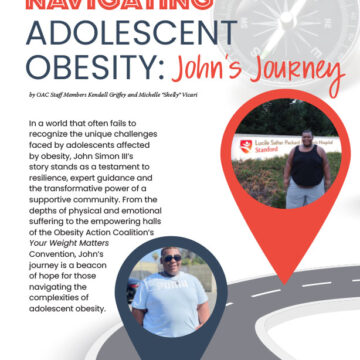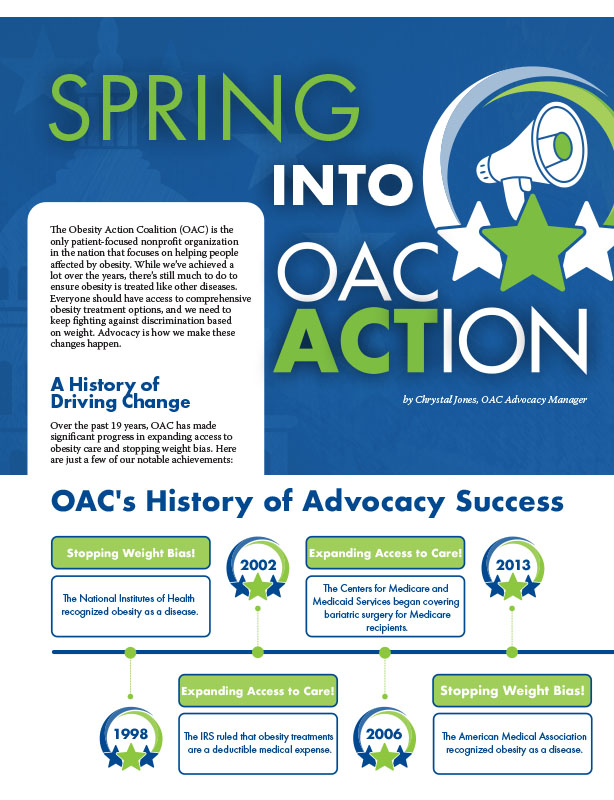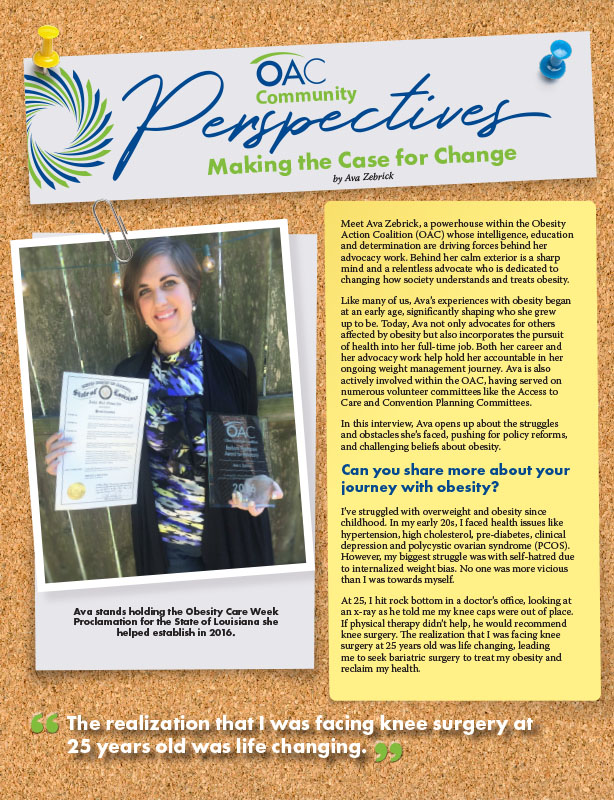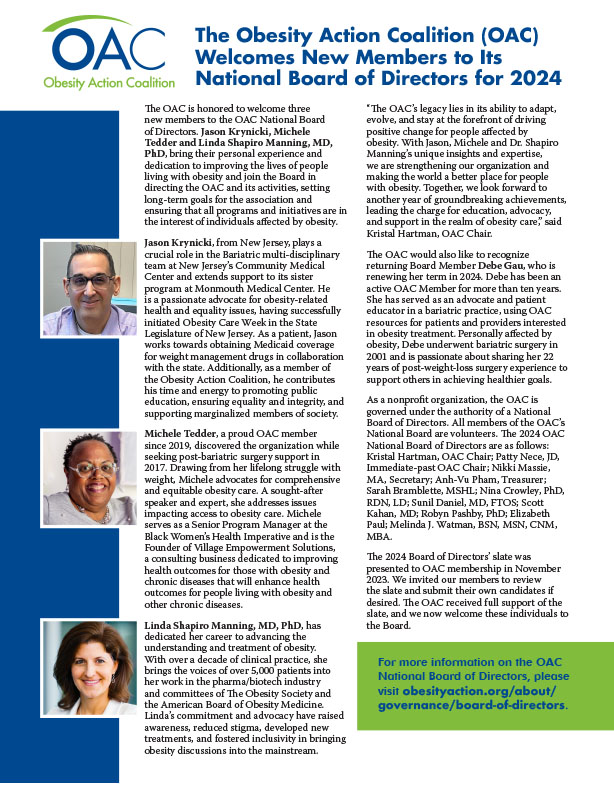OAC Community Perspectives: A Couple’s Take on Obesity, Self-Care and Mutual Support

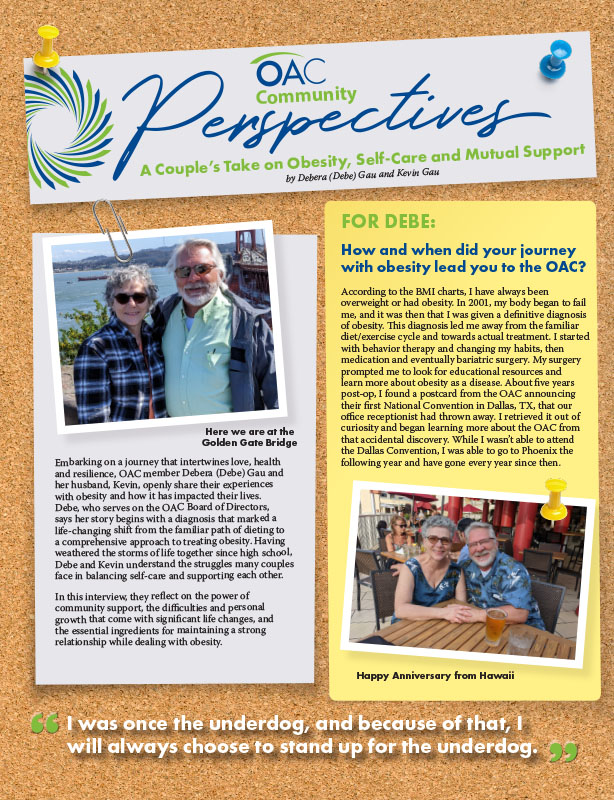
by Debera (Debe) Gau and Kevin Gau
Winter 2024
Embarking on a journey that intertwines love, health and resilience, OAC member Debera (Debe) Gau and her husband, Kevin, openly share their experiences with obesity and how it has impacted their lives. Debe, who serves on the OAC Board of Directors, says her story begins with a diagnosis that marked a life-changing shift from the familiar path of dieting to a comprehensive approach to treating obesity. Having weathered the storms of life together since high school, Debe and Kevin understand the struggles many couples face in balancing self-care and supporting each other.
In this interview, they reflect on the power of community support, the difficulties and personal growth that come with significant life changes, and the essential ingredients for maintaining a strong relationship while dealing with obesity.
For Debe:
How and when did your journey with obesity lead you to the OAC?
According to the BMI charts, I have always been overweight or had obesity. In 2001, my body began to fail me, and it was then that I was given a definitive diagnosis of obesity. This diagnosis led me away from the familiar diet/exercise cycle and towards actual treatment. I started with behavior therapy and changing my habits, then medication and eventually bariatric surgery. My surgery prompted me to look for educational resources and learn more about obesity as a disease. About five years post-op, I found a postcard from the OAC announcing their first National Convention in Dallas, TX, that our office receptionist had thrown away. I retrieved it out of curiosity and began learning more about the OAC from that accidental discovery. While I wasn’t able to attend the Dallas Convention, I was able to go to Phoenix the following year and have gone every year since then.
How has your involvement with the OAC impacted your personal journey with obesity and your relationships, especially with your husband, Kevin?
Getting involved with the OAC reinforced my understanding that choosing bariatric surgery was a treatment for a chronic disease and not an excuse to take the “easy way out.” I listened as others shared their stories, so similar to my own. I felt a connection to the individuals in the OAC Community, and hearing their stories empowered me to share mine. This opened the door to stronger communication at home. I realized I truly was not alone and that my obesity affected not just us as a couple but also our family.
What motivated you to want to become more actively involved with the OAC and advocate for people with obesity?
During the years I worked in a bariatric clinic, I experienced a lot of bias and censorship. This was new for me, and it really affected my self-esteem. When I attended my first OAC Convention, I participated in an introduction to advocacy session that focused on the power of our stories and the impact of sharing them. The session truly resonated with me and emboldened me to stand up for myself. Because I had already been impacted by hearing the stories of others, I knew I could help others by sharing my own. I was once the underdog, and because of that, I will always choose to stand up for the underdog. I wanted to use my voice to help give others theirs.
For Debe and Kevin:
Balancing personal health goals with the needs of a relationship can be challenging. How do you strike a balance between self-care and caring for each other?
Kevin: If you love someone, it’s easy.
Debe: We’ve been together since high school. I agree that a long history makes it easier. A big part of caring for one another is also caring for yourself. This may seem selfish on the outside, but if you are not taking care of both your physical and mental health, it will negatively affect your partner. Self-care may mean that we take solo vacations or pursue interests that the other doesn’t share, such as sports. Giving each other the freedom to be an individual is crucial for maintaining a healthy and supportive relationship.
Oftentimes, relationships are tested during significant life changes, such as weight-loss or medical interventions. How did you both manage these transitions?
Kevin: When Debe had her surgery, it was exciting because we knew it would improve her health and physical abilities. As time went on, the person I held in my arms for so many years began to feel different, and it was definitely an adjustment for me. I remember talking to her about it and how it made me feel. I think that helped a lot.
Debe: The post-operative period of rapid weight loss that Kevin is referencing was a very interesting time for both of us. I was becoming someone I didn’t recognize, and when he shared with me what he was going through, it made us both realize we needed to add space for each other’s feelings. We also realized this wasn’t a singular experience. We shared many feelings of confusion, loss, and insecurity. Learning this helped us understand that we needed to have honest conversations and allow space to truly listen to each other. This was a moment of growth for us, as it helped us recognize that we needed to accept what the other was saying as truth and acknowledge what they needed for support. Communication is and will always be crucial.
In your opinion, what are some of the key ingredients for a successful relationship when one or both partners are dealing with obesity?
Kevin: Support each other and communicate.
Debe: As partners, we may not always see what the other is going through because we are looking through a lens of love, which can be subjective. I think you need to step back and say, “Okay, if this is what you are feeling, then how can I help, or what do you need from me?”
Communication is crucial in any relationship. Can you share some strategies you’ve found helpful for discussing and addressing obesity-related challenges and goals with each other?
Kevin: Know when to listen and know when to share.
Debe: We already mentioned some of these earlier, such as listening, giving space, acknowledging feelings, and having honest and sometimes difficult conversations. I find myself saying to Kevin, “I want to talk to you, and I just need you to listen.” This tells him that I may not need a solution or an answer. I may just need to say these things out loud before I can let go of or process them.
On a practical level, what are some everyday activities, routines, or habits you’ve incorporated into your lives to support each other with your health?
Kevin: Encourage each other to get active and make healthy choices. Our tandem bicycle is fun because you’ve got a captive audience, which makes conversation easy.
Debe: We like to take walks both alone and together, and walking the dog also encourages us to exercise. We use our tandem bike often on road trips or trail rides. We also respect that we have different interests and allow for individual pursuits without judgment.
Do You Want to Share Your Story or Be Interviewed?
Whether you have a story about navigating obesity, facing weight stigma, or inspiring others, your voice is important. If you want to share your story to support, inspire, or encourage others, please email membership@obesityaction.org. The power of your voice can light up a future issue of Weight Matters Magazine!
by Chrystal Jones, OAC Advocacy Manager Spring 2024 The Obesity Action Coalition (OAC) is the only patient-focused…
Read Articleby Ava Zebrick Spring 2024 Meet Ava Zebrick, a powerhouse within the Obesity Action Coalition (OAC) whose…
Read ArticleThe OAC is honored to welcome three new members to the OAC National Board of Directors. Jason Krynicki,…
Read Article




